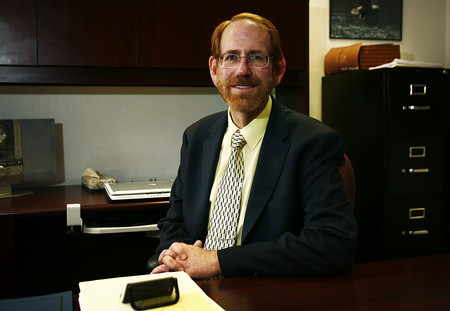If this official visits on a Friday, bank’s end may be near
George Burns is a low-key and mild-mannered state official, but he's about the scariest person a bank or credit union executive ever will see on a Friday afternoon.
When Burns shows up at a bank on a Friday, he's probably is going to close it.
The bank's deposits may be sold to a healthier lender. Employees may lose their jobs. Executives may end their careers. Bank stockholders will be wiped out. And customers may lose some of their savings that exceed the $250,000 insurance coverage limit.
It's an unpleasant task for anyone, but particularly a former banker who made a career of helping banks resolve regulatory issues so they could survive.
Burns said his father, a career Marine gunnery sergeant, instilled in him the values that keep him at the job.
"Sometimes, it's hard to come into work because of the things we have to deal with," Burns said. "There are days that I cringe. It is that difficult. If I hadn't had that much steel put into me by my father, I don't think I could do this."
Question: What was it like growing up as the son of a Marine drill sergeant in Southern California?
Answer: The recruits were saying how hard my father was and everything else, and I said, "Boot camp is only six months long for you. I've been at it for almost 18 years."
Question: How was your father strict?
Answer: It was standard military code about duty, honor, country. Being responsible, being accountable, being very disciplined in owning up to responsibilities.
Question: What did you do after graduating from the University of California, Riverside?
Answer: I moved to Lake Tahoe, because I wanted out of Southern California. I had been accepted by the Columbia School of International Relations graduate school, but I had so many student loans.
I started working as a mechanic's assistant. I was under a car welding a bumper on and this weld spark came flying off and went into my ear. I said to myself, "This is not what I went to college to do."
I saw an advertisement for teller positions at Nevada National Bank in Zephyr Cove. I started as a teller, and I worked my way up. Eventually, I was an operations officer. Operations work includes policies, procedures, compliance (with regulations), audits and all of the back-room operations, such as data processing.
Question: Your career, like the careers of many bankers, has been punctuated by bank mergers. You once had a key position with Bank of America.
Answer: In 1996, Bank of America consolidated its retail compliance operations into its regional headquarters in Phoenix. I took over the position of the Southwest region retail compliance manager for 600 branches in eight states.
When I became Financial Institutions Division commissioner, I saw (the job) as an opportunity to get out of the corporate banking rat race. I knew there would be challenges here, but I didn't expect them to become more difficult than anything I had ever done in my career.
Question: What happens when a bank fails?
Answer: We go into the institution. We take the president or CEO or the executive officer of rank who is present to the side. And, at the close of business, the state reads its closing order. We close the bank, revoke its charter and appoint the (Federal Deposit Insurance Corp.) as receiver.
Very formal. That's when the closure teams from the FDIC come into all the branches. The FDIC staff works through the night and the weekend. Then, the FDIC as receiver can say, "Receiving institution, here are the final books on this institution. We now give it to you."
Question: Why are bank regulators secretive about plans to close a bank?
Answer: If you announce this, everybody lines up and you have a scene like out of (the movie) "It's a Wonderful Life" in which everybody wants his money.
George (Bailey) is standing there and saying, "But I can't give you your money, because your money is in Joe's house and Mary's house and this other house, but I've got a little bit to get you by."
If you start telling people, "We're out of cash, we can't pay you," then you would really have a public panic.
Guess what? Once a bank has all its deposits pulled out of it, it's not worth anything to an assuming institution.
Question: Have we seen the last of the bank failures for a few years?
Answer: I pray every day that we've seen the last of them. After spending 28 years working for banks, one of the most heartbreaking things I've ever done in my life is to have to close a financial institution. It kills me every time I have to do that. But to protect the public interest, that sometimes is the only option.
I cannot say that we have seen our last (bank failure).
Contact reporter John G. Edwards at jedwards@reviewjournal.com or 702-383-0420.
NEVADAN AT WORK
Name: George Burns.
Age: 54.
Occupation: Commissioner, Financial Institutions Division.
Quotable: "One of the most heartbreaking things I've ever done in my life is to have to close a financial institution."
Family: Wife, Laurie; daughter, Danica.
Education: Graduate of the University of California, Riverside.
Work history: Vice president, Nevada National Bank; vice president, Security Pacific Bank; vice president and manager of the Southwest Region Retail Compliance, Bank of America; central operations manager, Comstock Bank; vice president and compliance manager, Community Bank of Nevada; compliance and internal controls manager, Business Bank of Nevada.
Favorite book: "Atlas Shrugged" by Ayn Rand.
Hometown: Vista, Calif.
In Nevada since: 1979.
The Financial Institutions Division is at 2785 E. Desert Inn Road, Suite 180, Las Vegas 89121. Its phone number is: 486-4120

















